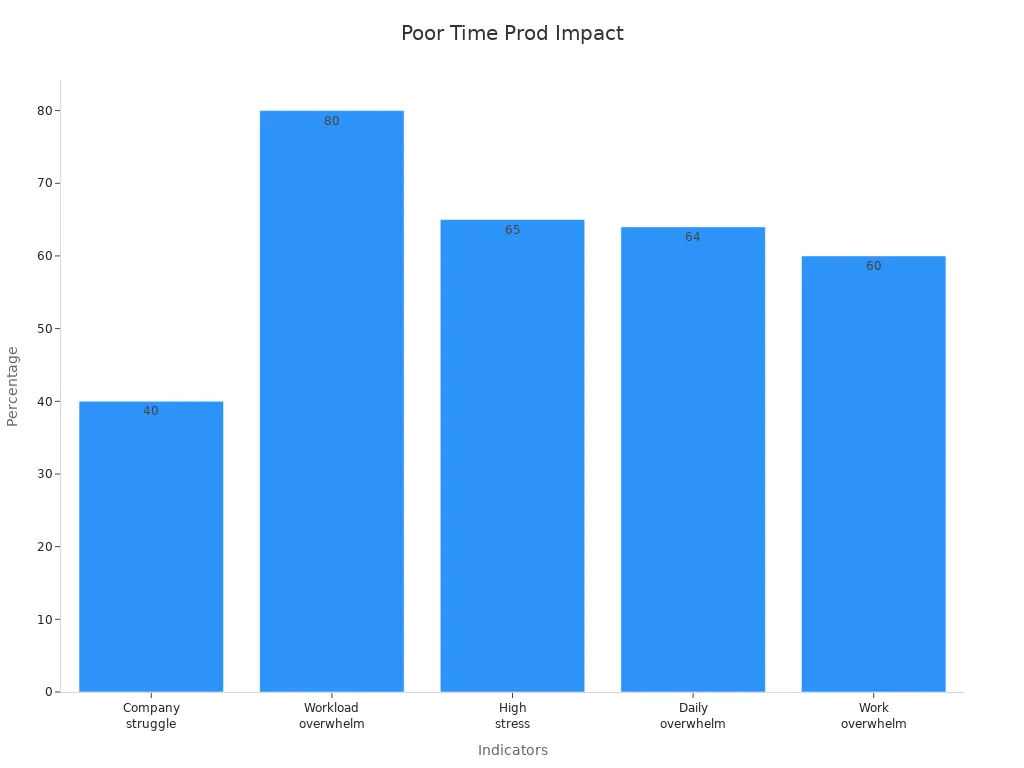Master Time Management with These Proven Tools and Tips

Do you ever feel like there’s never enough time to get everything done? Mastering time management can help you take control and reduce stress. It’s not just about staying busy; it’s about working smarter and more effectively. By planning your time wisely, you’ll feel more confident and in control of your day.
It enhances your mindset by boosting self-esteem and lowering stress levels.
It sharpens focus and increases productivity, empowering you to finish tasks and level up your career.
It fosters a healthier balance between work and personal time, giving you space to relax and recharge.
By making AI relatable and using it to streamline tasks, time management can transform the way you achieve your goals. Are you ready to master your time and feel accomplished in everything you do?
Key Takeaways
Managing time well helps you get more done and feel less stressed. Plan your day to stay in control and confident.
Try apps like Trello or Google Calendar to stay organized. These tools help you keep track of tasks and deadlines easily.
Use methods like the Eisenhower Matrix to rank tasks. Focus on urgent and important ones to use your time wisely.
Make time for self-care in your daily routine. Resting and taking care of yourself improves focus and helps you work better.
Be open to changes in your schedule. Leave room for surprises to stay calm and keep your life balanced.
Why Mastering Time Management Matters
The impact of poor time management on productivity
If you don’t manage your time, things can feel chaotic. Tasks build up, deadlines are missed, and stress increases. Poor time management wastes hours—workers lose about two hours daily on non-work tasks. That adds up to 520 hours a year! Think about what you could do with that time.
Not planning well also lowers productivity. Studies show 64% of workers feel overwhelmed by tasks, and 80% feel stressed from bad time management. This stress doesn’t just hurt your job; it affects your happiness and mental health.

Benefits of effective time management for personal and professional success
Good time management changes everything. It helps you focus, avoid distractions, and meet deadlines easily. With a time plan, you can balance work and life, feel less stressed, and even grow your career.
Here’s how it helps:
Increased productivity: You’ll finish more tasks in less time.
Better focus: A clear plan keeps you on track and distraction-free.
Higher quality of work: You’ll have time to do tasks well and meet goals.
Less anxiety: Meeting deadlines builds confidence and reduces stress.
Benefit | Description |
|---|---|
Increased productivity | Working smarter means doing more in less time. |
Better work-life-education balance | Balancing life and work helps you focus and avoid wasting time. |
Improved focus | Clear plans help you stay on task and avoid distractions. |
Higher quality of work | Managing time lets you finish tasks carefully and meet goals. |
Less anxiety and stress | Meeting deadlines often makes you feel confident and calm. |
How time management improves overall well-being
Time management isn’t just for work—it’s for enjoying life too. When you plan well, you make time for fun, family, and rest. This balance prevents burnout and helps you feel refreshed.
Good time management also helps your mental health. Research shows 91% of people think it lowers stress, and 83% say it helps them make better choices. Using tools like calendars or setting priorities gives you control and helps you reach your goals.
Top Tools for Time Management
Best digital tools for task management and time tracking
Digital tools make managing time simple and effective. They help you stay organized, track tasks, and remind you of deadlines. If you want to work smarter, try these popular tools:
Trello: Organize tasks visually with boards and lists. It’s great for step-by-step project tracking.
Asana: Ideal for teamwork. Assign tasks, set deadlines, and check progress in one app.
Toggl Track: Tracks time spent on tasks. It’s useful for seeing where your time goes.
Tip: Many time tracking tools connect with apps like calendars or payment software. This helps you manage schedules and payments easily.
Studies show 79% of businesses work better with automation tools. Also, 73% say these tools improve work quality. Using digital tools saves time and lets you focus on what matters most.
Benefits of using physical planners and journals
Digital tools are handy, but writing things down has its perks. Physical planners and journals help you stay focused and mindful. They’re perfect for people who enjoy hands-on planning.
Here’s why they’re worth trying:
Writing tasks by hand helps you remember them better.
You can design your planner to match your style and needs.
It’s a screen-free way to plan, which reduces distractions.
Many people feel physical planners make schedules more personal. You can add notes, doodles, or stickers to make planning fun. Crossing off tasks feels rewarding and boosts motivation.
Scheduling apps for organizing your day effectively
Scheduling apps are great for staying on track. They help you plan your day, set reminders, and block time for tasks. Some top apps include:
Google Calendar: Syncs across devices. Add events, reminders, and color-code your schedule.
Microsoft Outlook: Combines email, calendar, and tasks in one app. Perfect for professionals.
Calendly: Makes scheduling meetings easy. Others can book time based on your availability.
Did you know? Time blocking can boost productivity by 25%, according to experts. Scheduling apps make time blocking simple for important tasks.
These apps keep you organized and ensure you meet deadlines. They’re helpful for busy schedules or managing multiple tasks.
Technique | Study Source | Productivity Boost |
|---|---|---|
Pomodoro Technique | University of Illinois | Better focus |
Time Blocking | American Psychological Association | |
Eisenhower Matrix | American Journal of Lifestyle Medicine | 25% boost |
Goal Setting | Dominican University of California | 76% success rate |
By mixing digital tools, physical planners, and scheduling apps, you can create a system that works for you. Whether you prefer tech or traditional methods, the right tools make time management easier.
Proven Time Management Techniques

Prioritization methods like the Eisenhower Matrix and ABC method
Does your to-do list feel too long? Prioritizing tasks can help you stay organized. Two great methods are the Eisenhower Matrix and the ABC method. These tools make managing your time easier.
The Eisenhower Matrix splits tasks into four groups:
Urgent and Important: Do these tasks right away.
Important but Not Urgent: Plan to do these later.
Urgent but Not Important: Let someone else handle these.
Neither Urgent nor Important: Remove these from your list.
This method helps you focus on what matters most. Half of the people using it feel more in control daily.
The ABC method is another easy way to prioritize. Label tasks as:
A: Must-do tasks for today.
B: Important tasks for tomorrow.
C: Tasks that can wait longer.
Using these methods can lower stress and improve time management.
Setting SMART goals for better focus and clarity
Setting goals helps you manage time well. But not all goals work the same. SMART goals—Specific, Measurable, Achievable, Relevant, and Time-bound—are more effective.
For example, instead of saying, "I want to be more productive," try this: "I will finish three big tasks daily for two weeks." This gives you a clear plan and deadline.
Companies using SMART goals see great results. One big company grew sales by 25% in three months. A tech company improved teamwork and got more done.
Case Study | Outcome |
|---|---|
Multinational Corporation | 25% increase in quarterly sales through SMART goal setting |
Mid-size Tech Company | Improved communication and accountability, enhancing overall efficiency |
SMART goals guide you to success. They help you focus and stay on track.
Using the Pomodoro Technique to enhance concentration
Do you find it hard to focus for long? The Pomodoro Technique can help. Work for short periods (25 minutes), then take a 5-minute break. These work sessions, called "Pomodoros," keep your brain sharp.
Research shows short work bursts with breaks improve focus. Sixty percent of people using this method feel in control most of the week.
Here’s how to try it:
Pick a task to work on.
Set a timer for 25 minutes and focus.
Take a 5-minute break when the timer ends.
After four cycles, take a longer break (15-30 minutes).
This technique boosts focus and prevents burnout. It’s a simple way to get more done.
Tip: Combine the Pomodoro Technique with SMART goals or prioritization for even better results.
Minimizing distractions and organizing your workspace
Distractions can ruin your focus without you noticing. A messy desk, loud noises, or constant notifications can make it hard to work. But with simple steps, you can create a workspace that helps you stay focused.
Start by cleaning your desk. A neat desk isn’t just for looks—it helps you think clearly. A study in the U.K. showed 40% of remote workers felt clutter hurt their focus. Spend a few minutes daily tidying up. Keep only what you need, like your laptop, notebook, and water bottle.
Your digital space matters too. Technology can help you work better, but it can also distract you. Try these tips to stay focused:
Turn off desktop notifications to avoid interruptions.
Use "Do Not Disturb" mode during work hours.
Timebox your tasks by setting specific times for work and breaks.
Use apps to track how much time you spend on useful tasks versus distractions.
AI tools can also make your work easier. They can handle repetitive tasks, organize your schedule, and filter out unimportant information. Using these tools wisely can help you focus on what’s important.
Lastly, make your workspace comfortable and quiet. Noise-canceling headphones or white noise can block distractions. Good lighting and a comfy chair can also improve how well you work.
Mastering delegation to focus on high-priority tasks
Delegation isn’t just for bosses—it’s a skill everyone can use. Giving tasks to others frees up your time for more important work. It’s one of the best ways to manage your time.
Look at your to-do list. Are there tasks someone else could do? Maybe it’s scheduling meetings, filing papers, or writing reports. Passing these tasks to others lets you focus on work that needs your special skills.
Studies show delegation helps businesses grow. A Gallup study of 143 top CEOs found that good delegation leads to faster growth and higher earnings. Entrepreneur Eli Broad said not delegating is a big problem for managers. This shows how important it is to let others help.
Here’s how to delegate well:
Pick tasks that don’t need your direct attention.
Choose someone with the right skills for the job.
Explain clearly what you expect and when it’s due.
Give them the tools and support they need.
Trust them to do the job, but check in to see progress.
Delegation isn’t about dumping work on others. It’s about sharing tasks so everyone can do their best. When done right, it helps you and your team get more done.
Adding Time Management to Everyday Life
Making your schedule flexible for balance
Life doesn’t always go as planned, and that’s fine. A flexible schedule helps you handle surprises without stress. Don’t fill your day with back-to-back tasks. Leave some extra time between activities. This way, you can adjust if something takes longer than expected.
For instance, when planning your day on a calendar, schedule important tasks but leave space for breaks or unexpected events. This method keeps you organized and less stressed. A study from Harvard Business Review found 85% of top workers succeed because they use flexible time management daily.
Being flexible doesn’t mean losing structure. It means creating a schedule that fits your needs. Use tools like reminders to meet deadlines while allowing changes when needed.
Why self-care is key to staying productive
Taking care of yourself is not a luxury—it’s essential. When you focus on self-care, you can plan better and meet deadlines. Simple things like sleeping enough, eating healthy, and taking short breaks help a lot.
Research proves this. Over 60% of people say self-care improves their work quality. Also, 67% feel more productive, and 71% are happier. These facts show self-care isn’t just about feeling good; it helps you focus and get more done.
Start small. Set reminders to stretch, drink water, or take a walk. These small habits help you recharge and stay energized all day.
Keeping track and staying responsible
Being responsible is important for managing time well. Tracking your progress shows what works and what doesn’t. Use a log or calendar to mark finished tasks. This keeps you organized and helps you meet deadlines.
Here’s how to stay responsible:
Make clear goals and break them into smaller tasks.
Use reminders to stay focused.
Share your goals with a friend for extra support.
Tracking also helps you see how you spend your time. Studies from the University of California, Irvine, show good habits cut procrastination by 50%. By staying responsible, you’ll meet deadlines and boost productivity.
Using time blocking to organize your day
Do you feel like your day ends before important tasks are done? Time blocking can help you stay in control. It’s a simple way to divide your day into sections and assign tasks to each one. This method lets you focus on specific tasks at specific times.
Start by writing down everything you need to do. Group similar tasks together. For example, spend an hour on emails, two hours on focused work, and 30 minutes planning tomorrow. By assigning tasks to blocks, you avoid doing too many things at once and stay focused.
Why does time blocking work?
It helps you focus on the most important tasks first.
It saves energy because you already know what comes next.
It gives your day a clear plan, making it easier to follow.
Research shows people using time blocking are 25% more productive. Apps like Google Calendar or Microsoft Outlook can help you set up blocks. You can even use colors to organize your schedule visually.
Tip: Add extra time between blocks for surprises. Flexibility keeps your plan realistic and stress-free.
Time blocking isn’t about working harder—it’s about working smarter. By planning your day, you’ll feel in control and get more done without feeling stressed.
Using Pareto Analysis to focus on key tasks
Have you heard of the 80/20 rule? Pareto Analysis is based on this idea: 80% of results come from 20% of efforts. It’s a great way to focus on tasks that matter most.
To try Pareto Analysis, list all your tasks or goals. Then, find the ones that make the biggest difference. For example, if you’re managing inventory, focus on items that sell the most. If you’re working on personal goals, choose actions that bring the most progress.
How does Pareto Analysis work in different areas?
Area | Example | Result |
|---|---|---|
Inventory Management | Focus on items with high sales. | Lower costs and faster turnover. |
Healthcare | Fix major patient complaints. | Happier patients and fewer issues. |
Public Health | Target big health risks. | Better health for more people and lower costs. |
Time Management | Work on tasks that boost productivity. | Get more done by focusing on important activities. |
Goal Setting | Choose actions that lead to success. | Reach goals faster by focusing on what matters most. |
In time management, Pareto Analysis helps you focus on tasks that give the best results. Instead of spreading yourself thin, you work on activities that matter most. This method improves productivity and makes your efforts count.
Note: Combine Pareto Analysis with time blocking for better results. Use your blocks to work on the 20% of tasks that create 80% of your success.
By using Pareto Analysis, you’ll stop wasting time on less important tasks and focus on what truly matters.
Learning to manage your time doesn’t need to be hard. Begin with one tool or method that feels right for you. You could use a planner, try short work sessions with breaks, or set clear and achievable goals. These easy changes can help you get more done and use your time wisely.
Improvement takes time, so enjoy small successes and change your plan if needed. You can do it! Start now, and see how better time management improves your day—and your life.
FAQ
How can I start improving my time management skills?
Figure out what’s most important to you. Use planners or apps to keep track of tasks. Begin with small steps, like planning your day or setting easy goals. Slowly create habits that fit your needs.
What’s the best tool for managing time effectively?
The best tool depends on what you like. Apps like Trello or Google Calendar are great if you enjoy using technology. If you prefer writing, physical planners are a good choice.
How do I stay motivated to stick to my schedule?
Celebrate little achievements. Break big tasks into smaller ones and treat yourself when you finish them. Tell a friend about your goals so they can help you stay on track.
Can time management help reduce stress?
Yes! Planning your day helps you feel in control and avoids last-minute rushing. It also helps you balance work and fun, making you feel happier and less stressed.
Is it okay to adjust my schedule during the day?
Of course. Being flexible is important for good time management. Leave extra time for surprises and change your plan if needed without feeling bad about it.
See Also
Discover 5 Ways to Make Money Using ChatGPT Now
Utilizing NexToolkit Effectively to Resolve Online Problems
The Role of AI as Your Growth Ally in 2025